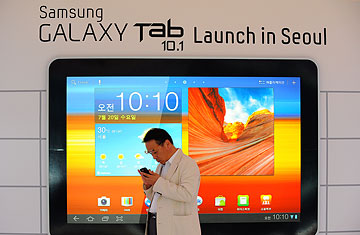
A South Korean man uses his smart phone in front of an advertisement for Samsung Electronics' tablet computer, the Galaxy Tab 10.1, at the company's main building in Seoul on July 20, 2011
(2 of 2)
Samsung's chairman and second-generation scion, Lee Kun-hee, made it his legacy to turn the company from a seller of bargain products into a maker of fancy inventions. In 1995, he ordered his employees to smash and then set on fire a mountain of 140,000 mobile phones, fax machines and other electronics worth $50 million. Lee Ki-tae (no relation to the chairman), a reformer tasked with improving the quality of Samsung mobile phones, tested handsets by dropping them out of his window, hurling them at walls and running them over with cars.
That rigor helped the company grow speedily. By the mid-2000s, Samsung had surpassed its entrenched Japanese rival Sony, both in yearly electronics sales and brand popularity, according to calculations by Interbrand, a New York City–based consultancy. The South Korean company has trumpeted the Galaxy as its latest innovation since its release in 2009 — making the Apple lawsuit particularly vexing for managers starstruck by the group's new prominence. Apple spokeswoman Kristin Huguet would not comment on the litigation.
Some analysts reckon that Samsung has been pursuing a tougher match against Apple since it overtook Sony. Around the time the iPhone was released, in 2007, Samsung was distracted by competition from Finnish handset maker Nokia, says one former Samsung mobile-phone designer who asked not to be named because Samsung is a customer of his current firm. "We were caught out of position," he tells TIME in Seoul. "The mood at the office was, Oh my God, we're just playing catch-up with the iPhone."
Still, Samsung supporters contend the company is actually the victim of bureaucratic excesses in the U.S. Patent and Trademark Office and its counterparts in Europe and Australia. Those government agencies, they say, grant too many broad and absurd patents, opening businesses to legal bullying that stifles innovation. Apple's exclusivity claims follow similar logic, covering what Samsung considers an excessive swath of technologies and designs — even if the Galaxy line resembles the iPhone's look and feel, says Mueller.
Even if Samsung's smart-phone future is up in the air, the company can fall back on a hidden weapon: its semiconductor division. Samsung is the largest memory-chip maker and second largest semiconductor supplier worldwide, capabilities that earned it $9.4 billion last year, or one-quarter of its electronics profits. Rivals such as Apple and Sony, ironically, are some of its biggest customers for those chip sets, using them in the iPad and the PlayStation 3.
That dependency could create a dilemma for Apple, which has reportedly been trying to curb its reliance on Samsung semiconductors ever since it drafted the legal accusations and, thus, might be planning to source microchips for the unreleased iPhone 5 from a Taiwanese company. Apple, however, will have trouble finding chip sets of the same quality at a similar price from non–South Korean manufacturers and could even face subtle vengeance from Samsung in the sector, warns Tony Michell, author of Samsung Electronics and the Struggle for Leadership of the Electronics Industry. "Samsung could decide that when they have a new idea, they won't mention it to Apple for a year or so," he says, which with future products could catch the iPhone maker off guard.
Nevertheless, Samsung can't rely too heavily on memory-chip sales in this year's bearish semiconductor market. Many makers of dynamic random-access memory (DRAM) chips are selling them at a loss because of falling demand and low memory-chip prices. But even in a boom, chip sets simply don't build the nameplate stature that Samsung seeks. "The most important issue to Samsung here is that it wants to be a major consumer brand for wireless devices as opposed to a mere manufacturer of components," says Mueller.
In a field where quarrels flare up and die unpredictably, Samsung's race to win technological prestige has run it into obstacles. "In the hurry to produce something like a smart phone or a smart pad," says Michell, "you're bound to, in this intellectual-property jungle where vines hang down across your path at every point, be in danger of a lawsuit from Apple." That poses particular hazards for an aggressive hardware maker like Samsung. Innovating in a rush similar to what Magaziner observed 34 years ago — even at the risk of being called a copycat — is bound to clash with the tech titans.
